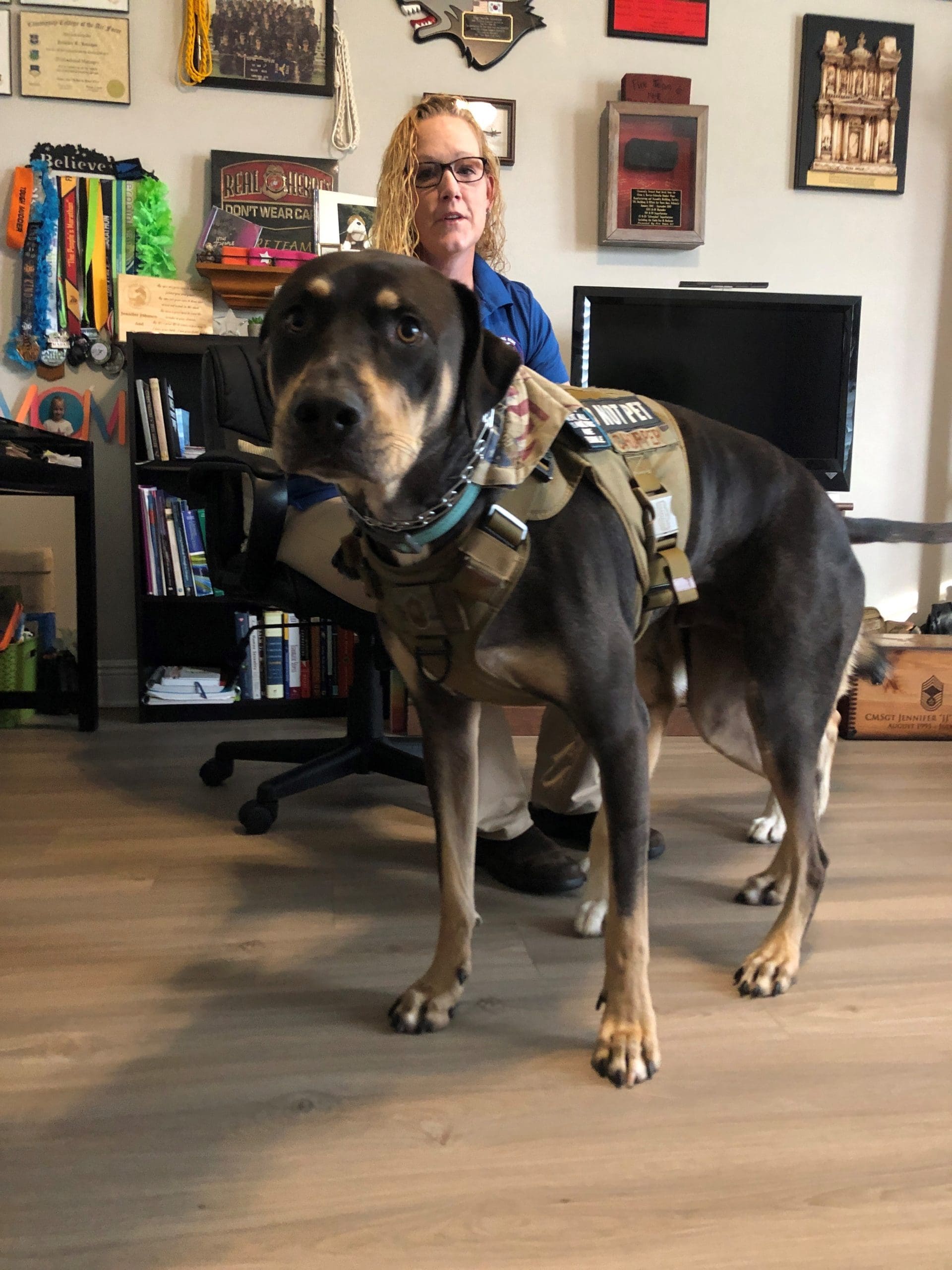
Navarre woman survived two military sexual assaults; service dog helps her heal
When Jennifer Johnson talks about her military career, she slips past the dark times — some of which lasted years. There are things she still can’t talk about.
Her service dog, Chopper, watches her closely. He is the only one who knows some of the darkest places she went during her 24 years in the military and in the two years since she was forced into retirement.
“Having my little wingman, who is not so little, he’s like a counselor because he listens,” she said. “He doesn’t talk back but he knows.”
Johnson’s career ended July 1, 2019, when she retired from the Air Force where she’d planned on spending 30 years. It was not her choice. As her mental and physical health crumbled, she had continued to do her job well enough to become the first female International Affairs Enlisted Engagements Manager at the Pentagon.
“I went from a circle the size of the Air Force to a circle the size of six,” he said.
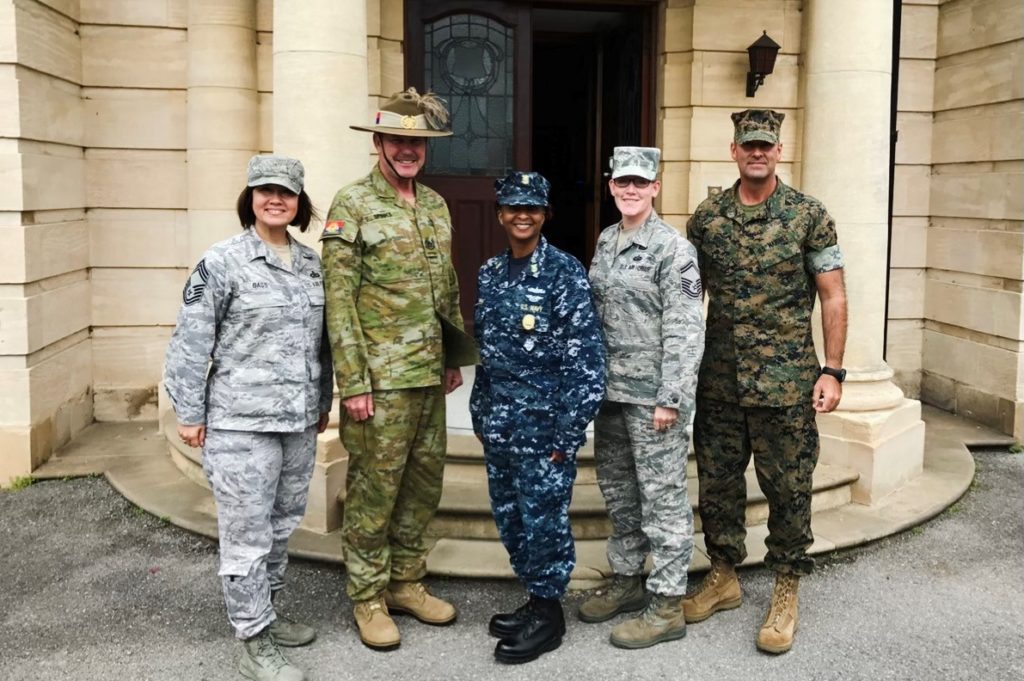
But a story about how her military career ended must start with how it began. Her father Richard Charles Schneider was a Marine, served in Vietnam and was a single dad.
“They always called me Junior,” Johnson said, adding that it didn’t make sense since she has a brother. “I always wondered why, and it took me until I was older to figure out the why of it.”
Sleight of hand
Her father wanted her to go to law school and that was the plan when she graduated from high school at age 16.
“I had a full ride to law school,” she said. “I was on this track to do all these great things as a civilian that my dad wanted.”
But what she wanted was to be in the military, like her dad.
When the Vietnam draft came up, her dad enlisted. He never talked about Vietnam but lit up when talking about being a Marine.
He might want something different for his middle daughter, but she wanted what he’d had.
On a day when she knew he would be busy, she went to his office in their Canton, Ohio home with a piece of paper in hand and told him she’d made her decision after talking to Air Force and Marine recruiters. She was, she announced, going to be a Marine.
“He was elated,” she said. “Loved it.”
But Johnson had decided on the Air Force and that was the paper she handed him to sign, knowing he was busy and wouldn’t read it. It wasn’t until she sent her first letter home from basic training that he realized his daughter had joined the “wrong” branch of the military.
“Hey Pops, it’s me, I’m safe,” she wrote in the letter postmarked from San Antonio. Texas.
The Marines don’t have a boot camp in San Antonio, he wrote back.
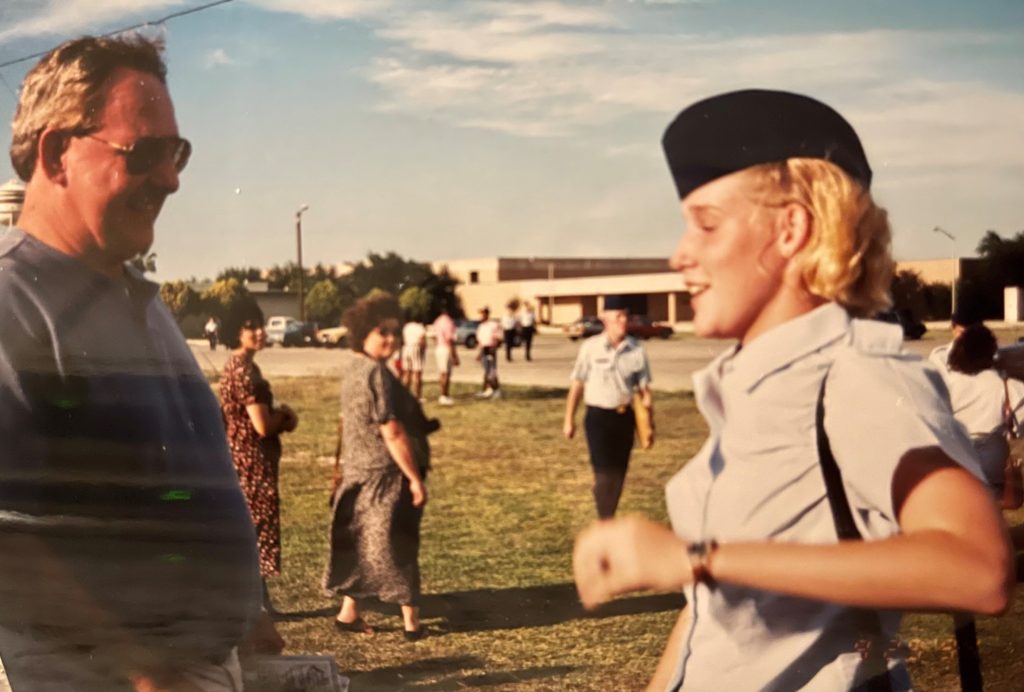
Johnson said she had a good reason for not telling him.
“He would have changed my mind,” she said. “I wanted to make one decision that I wanted to make all by myself.”
When they saw each other at graduation, he was a bit “salty.”
Years later, they had the conversation about her decision in which he told her it was the best thing she ever did.
“He said, ‘I know you did it for a reason, that you had to be you,” she recalled.
‘Everybody else was doing it’
After Johnson finished basic training, she was asked where she wanted to go. She describes it as having her life “dangled in front of her.” She was still 17.
“I’ll come right back home,” she reasoned, before requesting Ohio. It made complete sense to join the military to get away from home, only to come back home.
Instead, they sent her to Okinawa, Japan.
She arrived on an island that was “hot as junk” where the Christmas trees were brown because they’d died on the ship over. Four years, she told herself. Four years and she was getting out.
A trio of older airmen took her under their wing and tried to protect her. She turned 18 on Okinawa and by her 19th birthday, had decided she met the “love of her life.”
“I was young. I was 18 and everybody else was doing it,” she said. “I married the cutest boy on the softball field.”
Her protectors disapproved. Her father disapproved. Johnson did it anyway and about 18 months later, their son was born at just 28 weeks. He spent six months in a neonatal intensive care unit and the young family left Okinawa before her four years were up so the baby could get the proper medical care.
They were medically evacuated to Nebraska and divorced a year later. Their son, whom they successfully co-parented, is now taller than her and in the Air Force.
His early medical care had a price tag of $1.75 million dollars, of which she paid $1,900.
But having a premature baby and getting divorced – neither of those would be the most difficult points of a long military career.
Beaten into darkness
Johnson was in her mid-20s, stationed at a base in Illinois when she was violently sexually assaulted and beaten to the point where she started to lose her hearing.
The first four years had long passed, so she reset her clock to 10.
“I decided I was going to do the best I could do to stick it out,” she said.
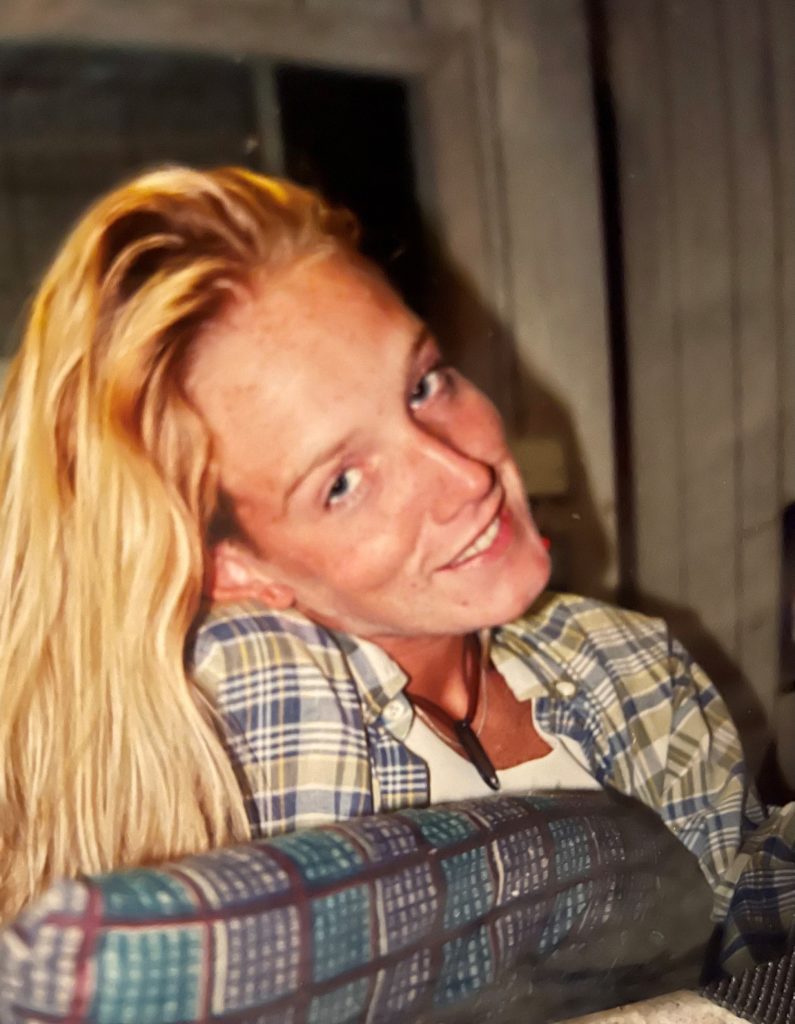
Then, two years later, she was sexually assaulted again.
“I became very untrusting of males and females,” she said. “No one could get that close. My (personal) bubble got as big as this house. I started using alcohol to cover things up in my head. It was not a great thing to do.”
Later that year, this “dark season” as she described it, one that got even darker when she was pulled off shift by military police and asked to surrender her guns on April 8, 2006.
“I didn’t do anything wrong,” she told them.
“We know,” they said and told her that her father had passed away that night. He was 59 and had died alone.
“That was the turning point in my career where I almost gave up everything,” she said. She took too many pills, drank too much Jim Beam and tried to check out. In her haze, she recovered enough to call a friend — something she has no recollection of doing.
The dark years continued though, even as she hid it from her peers and subordinates.
“It was just ugly,” she recalled. It took everything I had to go to work. Every day I would come home and lock myself into my house. The only reason I had to live was my son.”
War zone
In 2007, she married her current husband, Gabriel Johnson, who had become a trusted friend. Eleven days later, she deployed to Afghanistan, where she spent seven months doing things that terrified her and made her stronger. She didn’t drink while she was there and, for the first time since her traumas, she started to get to know herself again.
She also developed an appreciation for living another day, after spending months in a place where that was far from a given.
The street to the airstrip was named Walt Disney Street and it was also the way home for military personnel who left the warzone in caskets.
“I’ve seen plenty of people get hurt and plenty of people die,” she said. “Anyone in or out of uniform lined up when we took a casket to be flown out. We might not know him. We might know him. I saw that day in, day out.”
She came home, had two more children – affectionately dubbed the “littles” because big brother, was almost a teenager.
Her career continued to blossom as she traveled the world meeting military leaders and became the face of enlisted female success in what had long been a male-dominated world.
But everything she had tucked away and only partially unpacked continued to pull her down. Despite making a pact with her husband that neither of them would take their own lives, she changed her mind after a friend committed suicide.
Leaving goodbye tapes for her family, she took her husband’s gun and her car and enough alcohol to see it through and drove away for what she thought would be the last time.
An on-board tracking system led her husband to her in time. Jennifer spent the week of Thanksgiving 2018 in the hospital, then months in rehab before being pushed into retirement five years before she had planned.
‘Save a veteran, rescue a dog’
The next year was “nothing” as she put it. Her world became small.
According to the military, she was 220% disabled and had nine diagnosed mental illnesses. She also had six degrees on the walls of her home office. Even as she struggled, she continued her education, earning advanced degrees, most in psychology and trauma.
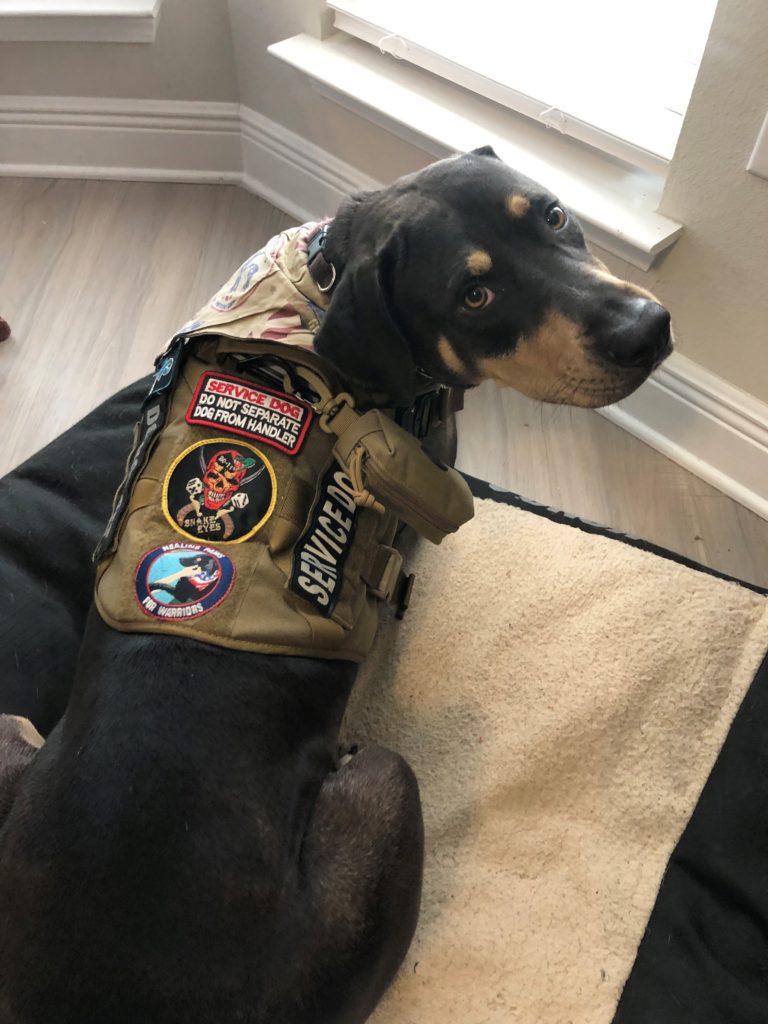
“I want to be a person who knows where people come from that find themselves in a dark place,” she said. “Because I came out of mine through help. I want to be that person they can come to.”
Six months later, she picked up a brochure about Healing Paws for Warriors in a counselor’s office.
“Save a veteran, rescue a dog,” is the organization’s motto.
Twenty-two pages of revealing, gut-searing information later, the summer of 2020 brought Chopper into her world.
Rescued himself at four months, Chopper has his own past, which includes a distrust of men. He is reserved, an old soul at 2 years old, but perfect for Johnson.
He grounds her when she panics by placing his paws on her shoulders. He stands between her and anything that might be a trigger. He is always vigilant.
Being saved
Now, she lives in a house in Navarre with her “littles” and her husband and a varying number of dogs. On this day, she has five — Chopper, a service dog named Fate whose new owner didn’t finish their eight weeks of training and an old dog named Chief who thinks he’s a service dog. The other two aren’t seen but can be heard in the back of the house.
Two large dog beds are in front of the windows in the office, which she and her husband have lined with their combined 40-plus years of military service memorabilia.
The bed on the right is Chopper’s.
He saves her, every day, from the darkness that will always chase her.
“When I really, really am in a bad place, he’ll go in our room and start bringing me toys,” she said. “He’ll bring me toy after toy until I play with him.”
Her father’s absence is always with her. He is the family that should be there. She has no contact with her siblings. Her mom left when she was 10.
Her dad was a mirror of his daughter. After he died, she read all his journals and finally understood why she’d been nicknamed Junior as a child.
“It was more than we just looked alike,” she said.
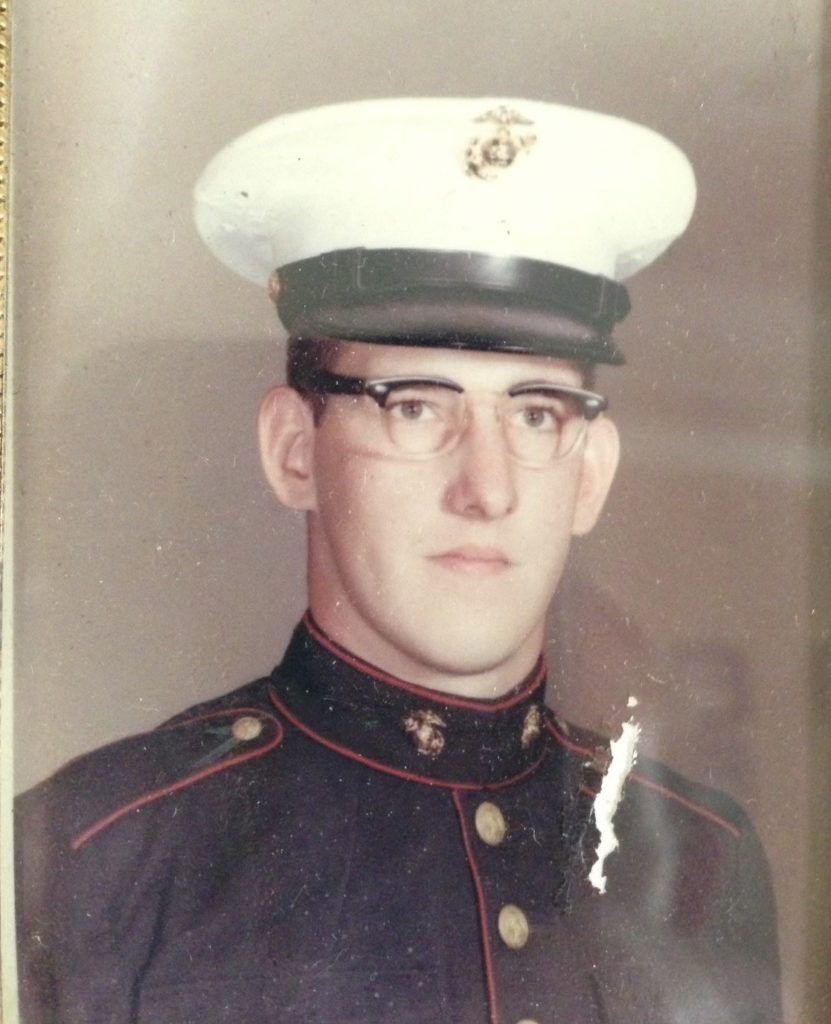
Now 45, she hasn’t celebrated a birthday since she was 29, but not for the usual reasons. Since her father didn’t get to turn 60, she was never turning 30.
He was also her truest measure of success.
“I never had a childhood in so many ways,” she said. “I knew that even though I didn’t choose the ‘right’ service, he was proud of what I’d become.
“I had all these things I wanted to show him I could do as a grown-up.”







